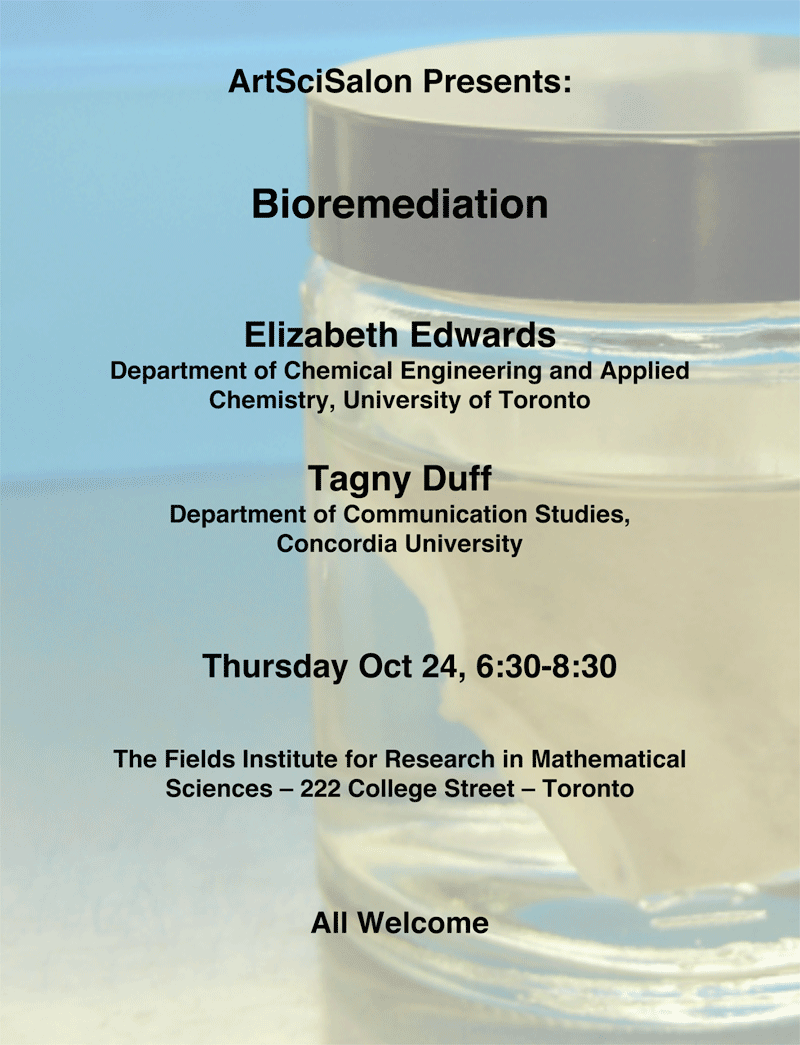When: Thursday Oct 24, 6:30-8:30
Where: The Fields Institute for Research in Mathematical Sciences 222 College Street, Toronto
Elizabeth Edwards – New Frontiers in Bioremediation
Tagny Duff – Viral BioreMEDIAtion
Abstracts
Elizabeth Edwards
New Frontiers in Bioremediation
Groundwater contamination is a serious threat to global health and prosperity. Chemicals that are widely used in industry or dry-cleaning are common groundwater contaminants. Because they are very toxic, even small spills render groundwater unsuitable for use. Cleanup is typically a costly and very slow undertaking.
Recently, a fascinating group of soil microorganisms has been discovered that can naturally degrade some of these chemicals to a benign product. Dr. Edwards has harnessed this innate ability to create a remediation technology using microorganisms that is now in use at several hundred contaminated sites around the world. The hunt is on to further explore nature’s diversity to discover other unusual bugs capable of detoxifying a broader range of contaminants. New molecular biology and metagenomic tools are helping us understand how these microorganisms make a living, and how we can take advantage of their abilities to clean up the environment.
Tagny Duff
Viral BioreMEDIAtion
This talk will focus on the term “bioremediation” as it applies to the research-creation project Viral BioreMEDIAtion (Funded by the FRQSC). Expanding from media theorists Jay Bolter and Richards Grusin’s notion of remediation, I will situate current media art, biological art and scientific methods and practices used in the laboratory environment with issues of ecology presented via the scientific term and practice of bioremediation. How might the materiality of processes and materials used in research laboratories be reconfigured and reimagined via the notion of bioreMEDIAtion?
Bios
Elizabeth Edwards is affiliated with the Department of Chemical Engineering and Applied Chemistry, University of Toronto and is the director of the Biozone. Dr. Elizabeth Edwards holds Bachelor’s and Master’s degrees in Chemical Engineering from McGill University, Montreal, and a PhD degree (1993) in Civil and Environmental Engineering from Stanford University. She is internationally known for her work on anaerobic bioremediation, the application of molecular biology and metagenomics to uncover novel microbial processes, and the transition of laboratory research into commercial practice to develop bioremediation and bioaugmentation strategies for groundwater pollutants.
Tagny Duff is an interdisciplinary artist working across bioart, video, performance, net art and installation works. Duff currently directs Fluxmedia Research-Creation Network, a laboratory exploring the cross over between art and life sciences. She is Assistant Professor in the Department of Communication Studies at Concordia University. Works includes Wetnet (2012) developed at Ectopia in collaboration with Cultivamos Cultura and the URIA-Centro Patogenese Molecular, Faculdade Farmacia at the University of Lisbon. This was exhibited in Emergencies2012, Portugal. The Cryobook Archives (2010) and the Living Viral Tattoos (2008) exhibited in Montreal (2011), Dublin (2011), Moscow (2009) and Keliningrad (2008).

Comments are closed